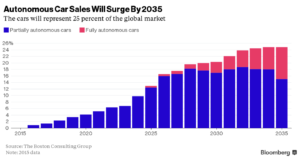Your dad is a wealth manager. You grew up learning about stocks and bonds, budgeting your allowance, and wanting to be just like him. Now, its college time and your schedule is booked up with finance and consulting classes to ensure a bright future. But, what is the bright future if, by the time you graduate, the job position is filled. By who? A robot. Your dreams of working in your dad’s enterprise as a wealth manager are replaced by an algorithm.
The exponential growth of automation is fascinating to many, but take a step back. If everything becomes automated, what will people do? Already, taxi drivers are seeking new opportunities. Self-driving cars are projected to skyrocket, and eventually, there will be no need for taxi drivers anymore.
Based on an article the World Economic Forum, author Florian Leibert discusses that “autonomous vehicles, complemented by car services such as Lyft and Uber, could make it preferable and more affordable to ride with robots rather than get a driver’s license.” Autonomous transit is projected to represent around 25% of the world by 2035.
With growth like this in all industries and verticals, people will have a hard time securing work and contributing to the economy. Based on an article in USA Today, author Paul Davidson explains that “half of all work activities globally have the technological potential to be automated” and “automation could destroy as many as 73 million U.S. jobs by 2030.”
Jobs that are most receptive to evolving with technology tend to be low wage jobs, as flipping burgers can easily be replaced with a robot. On the other hand, workers with higher wages are more secure with their job when considering the automation boom. This will lengthen the bridge from the rich and the poor, creating less opportunity for low-income households and a raise unemployment rate.
With automation at our fingertips, the government will have to support the increased amount of low-income households. Government spending will adjust their spending in ways to boost economic growth.
My take on this: robots are undoubtedly going to fill positions that humans currently hold. This will take away many jobs available for humans, but the technology boost will also allow for new jobs in every field. Someone needs to manage the production of these automated systems. Engineers must create the systems. Doctors must find the problem to initiate a solution. Human life is going to be more seamless but far more complex.
The economy will suffer, at first, trying to adjust to the shock of unemployment. But, as technology becomes more developed, people will find ways to generate income – which might be unconventional compared to the current state of the job market – and further support the economy. In the long run, the boost in technology calls for a more developed nation which leads to a successful economy. Check out China and the U.S.—two very distinguished locations when looking at GDP and growth. These two countries are also ahead of the game in the automation space.

Leave a Reply
You must be logged in to post a comment.